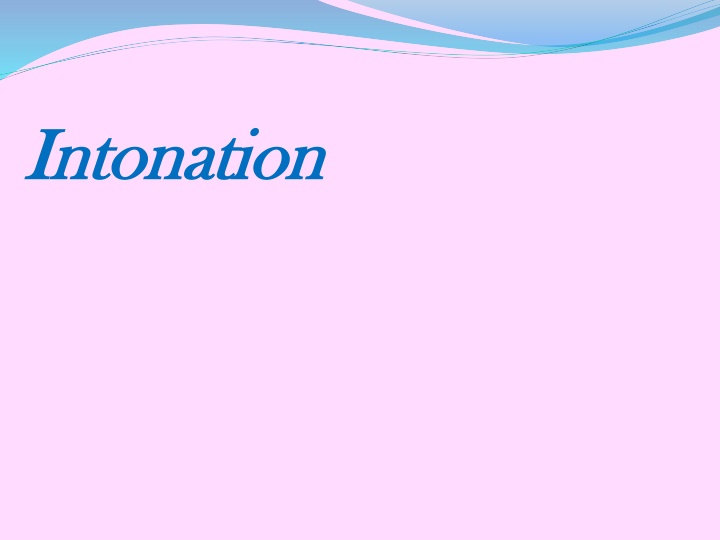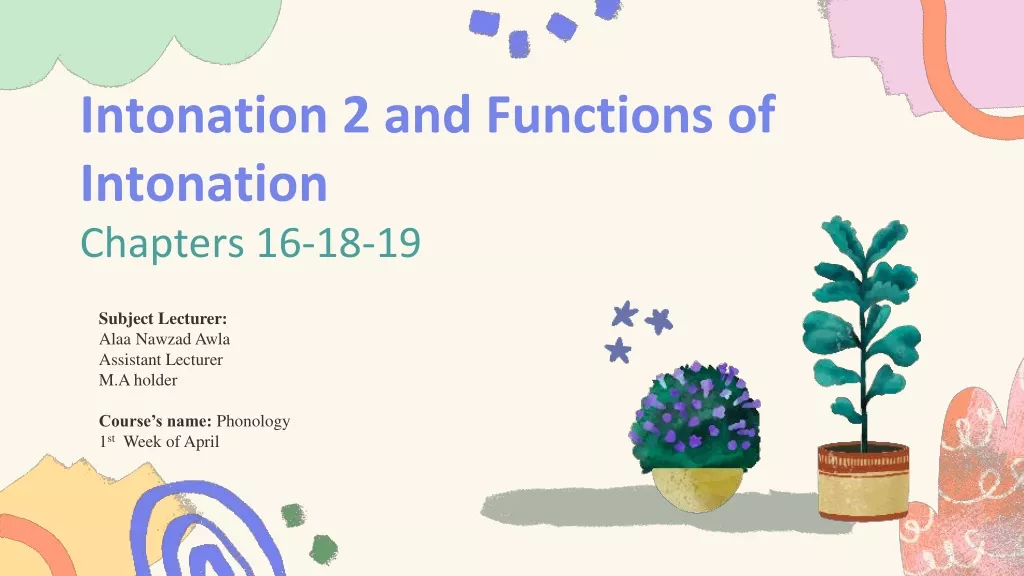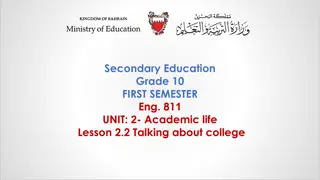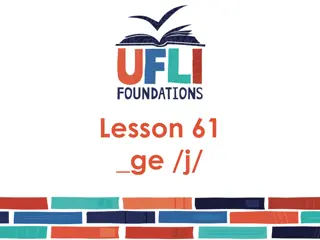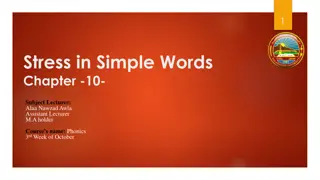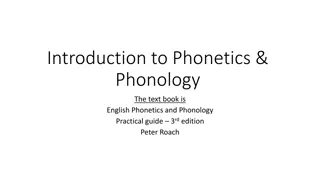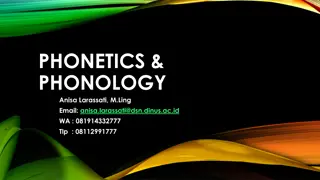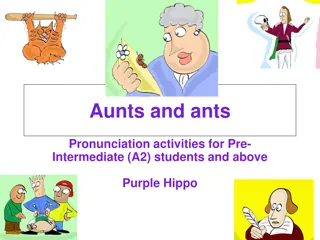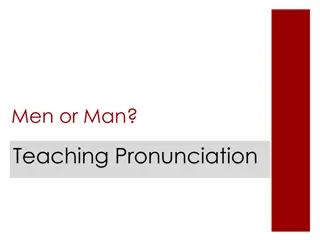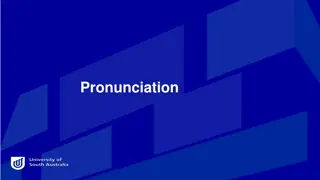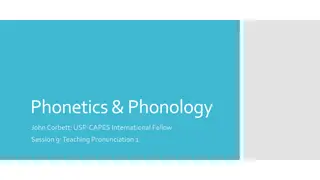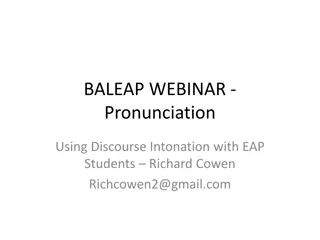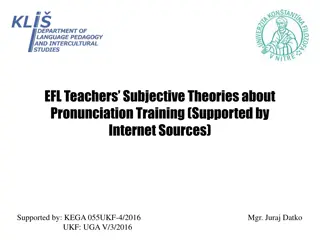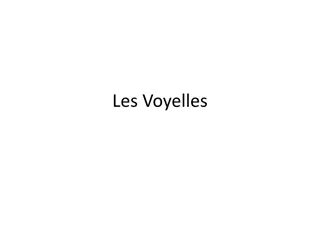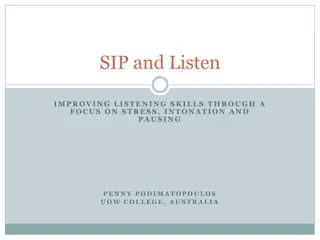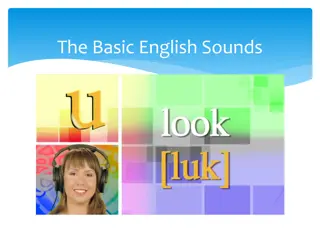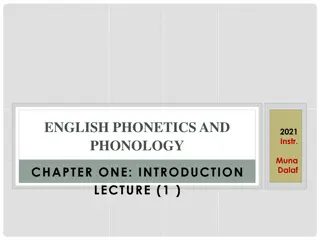Mastering Intonation and Pronunciation in Second Language Learning Process
Explore the nuances of intonation, syllables, stress patterns, compound words, and punctuation in language learning. Grasp the importance of intonation in conveying meaning and emotions effectively through practical examples and exercises.
Download Presentation

Please find below an Image/Link to download the presentation.
The content on the website is provided AS IS for your information and personal use only. It may not be sold, licensed, or shared on other websites without obtaining consent from the author.If you encounter any issues during the download, it is possible that the publisher has removed the file from their server.
You are allowed to download the files provided on this website for personal or commercial use, subject to the condition that they are used lawfully. All files are the property of their respective owners.
The content on the website is provided AS IS for your information and personal use only. It may not be sold, licensed, or shared on other websites without obtaining consent from the author.
E N D
Presentation Transcript
Intonation Intonation
Learning Second language Pronunciation Accent Intonation Rhythm Systemic formation : words/sentences
Syllable # Every syllable has one vowel sound i.e. one alphabetical vowel a, e, i, o, u # The number of vowel sounds in a word equals the number of syllables. E.g. girl bo-ttle ac-ci-dent par-ti-ci-pate ci-vi-li-za-tion e-xa-mi-na-tion
Stress on First Syllable Girl Madam Boy Toy Down Tiffin Friend Open Doll Prayer Shoes Last Class Stand Round Sing Prize Close Ball Bench Book Story Ground Sit Bag Box First Mother Bat Poem Teacher Water Play Turn Come Tell Door Father School
Pencil Erasure Vacation Office English Examination Paper Tomato Grammar Patato
Compound Words Classroom water bottle Tiffin box Class Teacher Wash room Note book School bag Head Mistress Time Table Lunch Break School Fees School Bus
Intonation Punctuation All Languages have Melody Music of Language Intonation
What to say? How to say it? Intonation --- Changes the Meaning of a word Expresses Emotions Voice Quality : Louder / Softer # Pitch Change in Pitch ~ Intonation
e.g. :Would you help me please? : Yeah
I: Asking Questions- Rising Intonation i) Yes-No Questions: Are you coming? Is her name Priya? Do they really want to learn this? Could you give me a pen, please? Situations Shall we start?
Falling Intonation ii): Wh- Questions What s your name? Where do you live? Why are you late? When does the school start? How will you go?
Falling Intonation iii) Statements:(Facts / Information) I m a teacher. She is my friend. I was on a two-day leave. We are having a training programme. My school is in Karad.
Falling Intonation iv) Listing Things : 1,2,3,4, and 5 Get, Set ,Go I like Pok mon, Doremon, ShinChan & Superman.
Rising Intonation v) Expressing Feelings: (Happiness, Excitement, Fright) I can t believe you won the first prize. Hurray! We are selected. Wow! We ve have holiday tomorrow! I am scared of snakes.
Rising Intonation: vi) Stressing the importance of something : She is wearing red today. I will bring you a gift. She wants chocolates.
Rising Intonation: vii) Things of Contrast: Do you want tea or coffee? I love dogs not cats. Does she speak English or Hindi? I want apple , I don t want orange.
Rising Intonation viii) Tag Questions (Unsure ~ Confusion) You will come, won t you? You are happy, aren t you? He broke the glass, didn t he? Falling Intonation (Surety) It s a beautiful place, isn t it? You must have a dictionary, mustn t you?
Falling Intonation ix) Commands: Sit down. Go there. Come here. Don t shout. Stop it . Stand up. Close your books. Don t run Go away.
Rising Intonation Greeting after a long time: (Informal) Hey Priya..Long time no see Hey Priya I haven t seen you in ages. Falling Intonation Formal: it s been a long time Nice meeting you here.
Falling Intonation: Greetings ( Formal) Hello How are you? How is it going? How do you do? Rising Intonation: (Informal) - interest Hi How are you? Hi What s new? What s going on? Hey What s up? What s happening?
Greetings cont. Falling Intonation: (Formal): Good Morning! Good evening!/ night! Rising Intonation: (Informal): Good Morning Good afternoon
Other I m Sorry Excuse me Not at all Hello Come again Thank you My pleasure You re welcome see you
